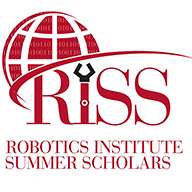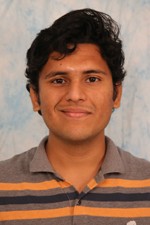Student Talks
Robotics Institute Summer Scholars Program (RISS) Lunch Workshop
By Invitation Only - Weekly lunch workshop for all RISS students.
Active Illumination for the Real World
Abstract: Active illumination systems use a controllable light source and a light sensor to measure properties of a scene. For such a system to work reliably across a wide range of environments it must be able to handle the effects of global light transport, bright ambient light, interference from other active illumination devices, defocus, and [...]
Situational Awareness and Mixed Initiative Markup for Human-Robot Team Plans
Abstract: As robots become more reliable and user interfaces (UI) become more powerful, human-robot teams are being applied to more real world problems. Human-robot teams offer redundancy and heterogeneous capabilities desirable in scientific investigation, surveillance, disaster response, and search and rescue operations. Large teams are overwhelming for a human operator, so systems employ high level [...]
Robotics Institute Summer Scholars Program (RISS) Lunch Workshop
By Invitation Only - Weekly lunch workshop for all RISS students.
Robotics Institute Summer Scholars Program (RISS) Lunch Workshop
By Invitation Only - Weekly lunch workshop for all RISS students.
Robotics Institute Summer Scholars Program (RISS) Lunch Workshop
By Invitation Only - Weekly lunch workshop for all RISS students.
Robotics Institute Summer Scholars Poster Session and Research Showcase
Come celebrate with the scholars. Refreshments will be served. Many thanks to RISS mentors, partners, and sponsors for making this undergraduate research program possible.
Discovering and Leveraging Visual Structure for Large-scale Recognition
Abstract: Our visual world is extraordinarily varied and complex, but despite its richness, the space of visual data may not be that astronomically large. We live in a well-structured, predictable world, where cars almost always drive on roads, sky is always above the ground, and so on. As humans, the ability to learn this structure [...]
Deliberative Perception
Abstract: A recurrent and elementary robot perception task is to identify and localize objects of interest in the physical world. In many real-world situations such as in automated warehouses and assembly lines, this task entails localizing specific object instances with known 3D models. Most modern-day methods for the 3D multi-object localization task employ scene-to-model feature [...]
Carnegie Mellon University
Compact Generative Models of Point Cloud Data for 3D Perception
Abstract: One of the most fundamental tasks for any robotics application is the ability to adequately assimilate and respond to incoming sensor data. In the case of 3D range sensing, modern-day sensors generate massive quantities of point cloud data that strain available computational resources. Dealing with large quantities of unevenly sampled 3D point data is [...]





